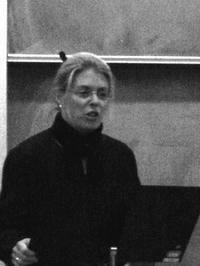 Are social scientists demonstrating their scientific ignorance by bringing a gender perspective into fields such as medicine and biology? Yet, perspectives from epistemology and scientific philosophy are crucial to a critical assessment of science and of objectivity.
Are social scientists demonstrating their scientific ignorance by bringing a gender perspective into fields such as medicine and biology? Yet, perspectives from epistemology and scientific philosophy are crucial to a critical assessment of science and of objectivity.
On December 20, 2004, ICU hosted a lecture by Professor Londa Schiebinger, with ICU Professor Murakami Yōichiro acting as moderator. An eminent feminist historian of science, Professor Schiebinger has examined the role of women in science through publications such as Has Feminism Changed Science? and The Mind Has No Sex?: Women in the Origins of Modern Science. This lecture was titled "Exotic Abortifacients: The Gender Politics of Plants in the 18th Century Atlantic World". If 'ethno-science' is defined as those systems of knowledge particular to individual cultures that do not fit into the framework of mainstream science, how was the 'ethno-science' of reproduction, such as contraception and abortion, practiced by women before such practice was abolished and the responsibility taken away from women by Western medicine, or, in other words, by male doctors in the name of 'science'? Professor Schiebinger's story unfurled from that of one plant whose seeds were traditionally used for their abortifacient properties. During the lecture, the audience was given an opportunity to touch the actual seed: I felt a fantastic thrill rush through me as I held the ancient abortifacient with my own hands. The discussion session that followed saw a lively debate on issues pertaining to sex and reproduction in modern medicine and biology, such as the Pill, Viagra, and aphrodisiacs, as well as on the politics of sex and gender.
The popular view that modernization has freed women from the restrictions of feudal patriarchy and facilitated their advance into the world of higher education and academia does not reflect the whole reality; in fact, certain academic paths which were open to women in pre-modern times have been coldly terminated with the advent of the modern age. Moreover, academia itself as a profession is not entirely free from the dualism of public and private or the gendered division of labour. In one of her books, Professor Schiebinger cites scientific philosopher Sandra Harding's argument that Western science, founded on European values of the abstract and the concrete, is simply another strain of ethno-science in which the norm of cultural neutrality is emphasized to the extreme. Although the usefulness of science should not be undervalued, we must also remember that Western science has been shaped by two cultural and historical frames, that is, 'modernity' and 'the West'. Gender has long been defined as a 'socio-cultural sexual difference' as opposed to 'biological difference'. However, biology, too, is itself a product of our society and culture.
At the end of her talk, Professor Schiebinger related to us some interesting background to the publication of one of her books: she was told by her Japanese publisher that the English title of her book Has Feminism Changed Science? would be better translated in Japanese as Has Gender Changed Science? Apparently, replacing 'feminism' with 'gender' makes the book sound more neutral, and therefore more marketable, to a Japanese readership. The story not only revealed the deep-rooted myths of neutrality and objectivity which still define our age, but also highlighted the increasingly crucial role which gender studies will be required to play in future.
Univ. of Osaka Graduate School : Kubota, Hiroyuki